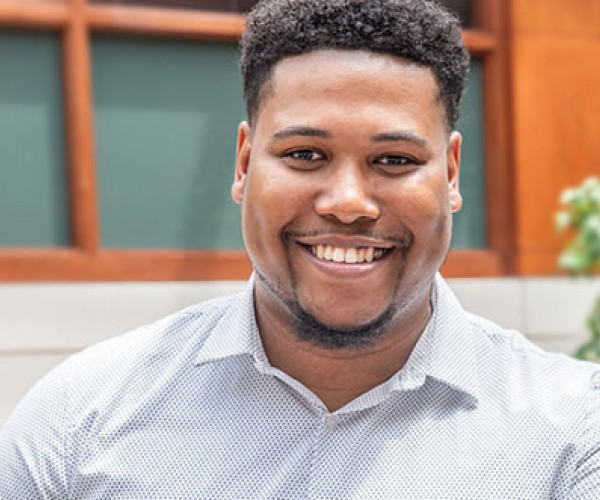University of Pennsylvania Carey Law School’s Future of the Profession Initiative affiliates with Access to Justice Tech Fellows and welcomes its first Innovator in Residence, Miguel Willis
The University of Pennsylvania Carey Law School announces that its Future of the Profession Initiative (“FPI”) will partner with Access to Justice Tech Fellows (“A2J Tech Fellows”), a nonprofit organization that develops summer fellowships for law students seeking to leverage technology to create equitable legal access for low-income and marginalized populations. A2J Tech Fellow’s Founder and Executive Director, Miguel Willis, will serve as FPI’s inaugural Innovator in Residence.
The new affiliation will expand summer professional development opportunities available to Penn Law students and will support the growth of partnerships among A2J Tech Fellows, the Law School and community partners who serve the public interest. The A2J Tech Fellows Program pairs law students with legal services organizations to develop projects that support the use of technology, data, and design thinking to bridge the justice gap in America. The program also promotes greater equity and inclusion within the legal profession through the cultivation of future leaders whose lived experiences can inspire law students from traditionally underrepresented backgrounds.
In his new role as Innovator in Residence with FPI, Willis will work closely with FPI leadership and colleagues around the Law School to educate new lawyers about the American access to justice crisis and the power of technology to better connect more individuals and small businesses with the legal system. Through mentorship, teaching and continued leadership of the A2J Tech Fellows fellowship program, Willis will work collaboratively to build upon the Law School’s focus on developing novel solutions to the growing problems that pervade the legal services ecosystem while developing a new generation of leaders from a variety of backgrounds.
“We are delighted to welcome Miguel to the Penn Law School community,” said Ted Ruger, Dean of Penn Law. “In his brief legal career, Miguel has already forged a leadership role that demonstrates that new approaches to durable problems can create real impact. We are thrilled he will be able to continue growing his work through his role with FPI while introducing our students the emerging career opportunities and social justice solutions a rapidly changing legal landscape invites.”
“I am deeply honored to assume this exciting new role and am enthusiastic that A2J Tech Fellows will call Penn Law home,” said Willis. “Affirming the importance of legal innovation, access to justice, and race equity, this new role and partnership will create opportunities for future lawyers to develop more innovative and effective ways to address our nation’s justice gap.”
Immediately prior to joining FPI, Willis served as the Law School Admissions Council’s (“LSAC”) inaugural Presidential Innovation Fellow.
“Miguel’s commitment to ensuring equitable access to justice drove many exciting initiatives during his time with us,” said LSAC President and CEO Kellye Testy. “We are delighted that our incubator program was successful in helping Miguel’s young organization advance its important work and that A2J Tech Fellows has now found its home at Penn Law. Through this fitting new partnership, we know Miguel will continue the charge for closing the nation’s justice gap, and we look forward to the wonderful strides he and his new colleagues will make together.”
Willis earned a degree in Political Science from Howard University. While completing his undergraduate degree, Willis worked with the Department of Justice’s Office of Immigration Litigation. He is a 2017 graduate of the Seattle University School of Law, where he founded A2J Tech Fellows and co-created Casebooker, a textbook marketplace app for law students. During law school, he served as President of the Black Law Students Association and on the National Black Law Students Association National Board. Willis was recognized as the 2016 National Jurist Law Student of the Year. His entrepreneurial spirit, drive to innovate and commitment to diversity and access to justice earned him the ABA’s designation as one of 2018’s Legal Rebels.
“We’re proud to have been an early supporter of Miguel’s innovative program,” said Seattle University School of Law Dean Annette Clark. “This is exactly the kind of values-driven leadership we love to see in our alumni, and we applaud Miguel as he continues to change the legal industry — and legal education — for the better.”
Willis’s role complements FPI’s recent addition of Jim Sandman L’76 to its leadership. Sandman serves as Senior Consultant to FPI and as President Emeritus of Legal Services Corporation, the largest provider of legal services to low-income individuals in the United States. Since joining FPI this past summer, Sandman has already used his role to advocate for pivotal changes to the regulatory structures governing lawyers that recently took effect in Utah and Arizona and he continues to advocate for similar expansive changes in other jurisdictions.
“Successful innovation in the legal profession requires a multi-faceted approach,” noted FPI’s Executive Director, Jennifer Leonard L’04. “Jim’s influential efforts to advance much-needed change to the way lawyers regulate the profession coupled with Miguel’s focus on deploying technology to connect more individuals with legal systems creates a powerful combination that will accelerate progress in better serving the clients who need us.”
Penn Law School launched FPI in October 2019 in recognition of the rapidly changing landscape that defines the modern legal profession. FPI’s mission is to “teach, lead and transform” by educating law students about the dynamic forces shaping the future of the profession, leading profession-wide conversations about innovation and attracting creative thinkers to the law school to transform the way legal services are delivered.
Read more about the Future of the Profession Initiative.





